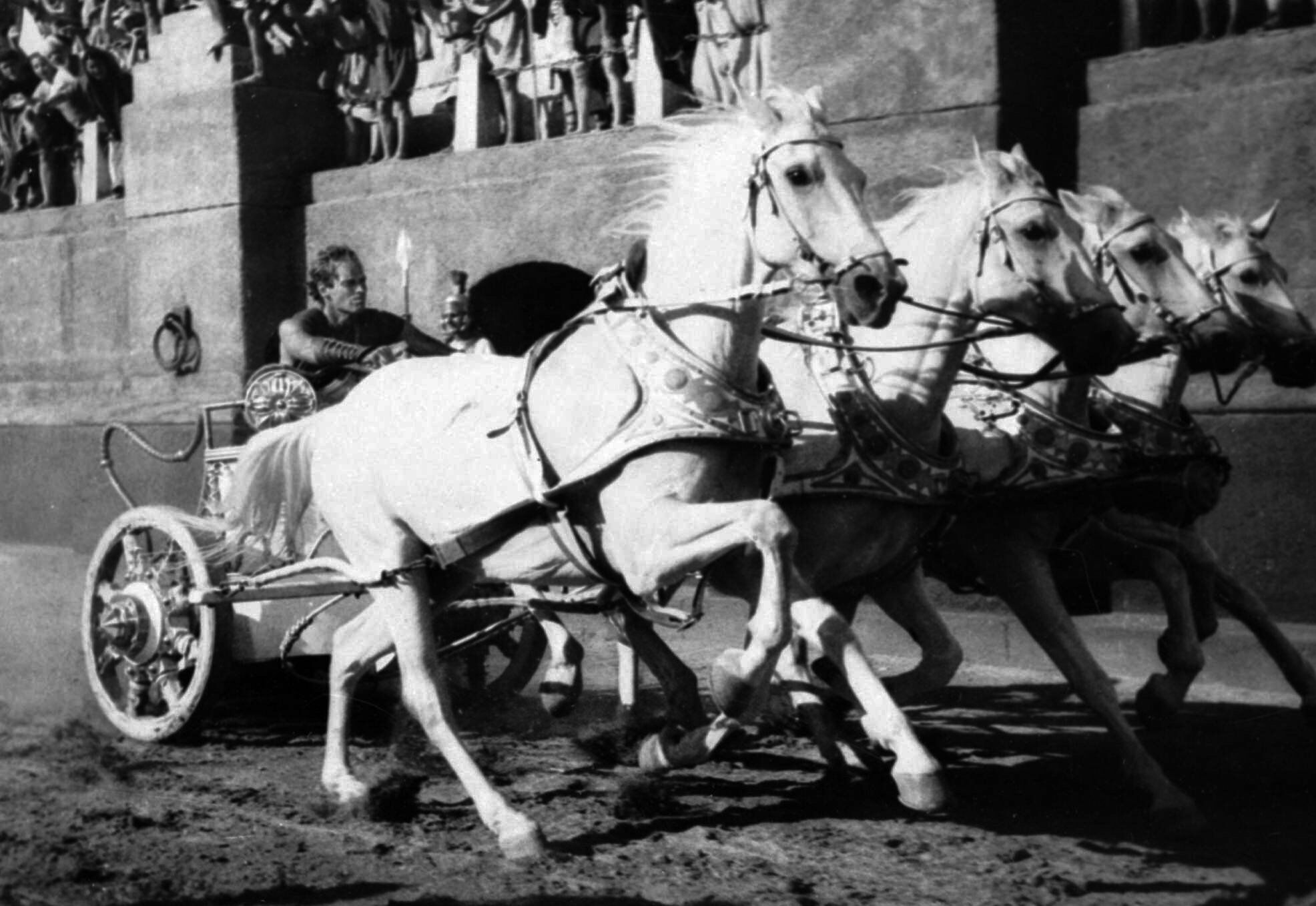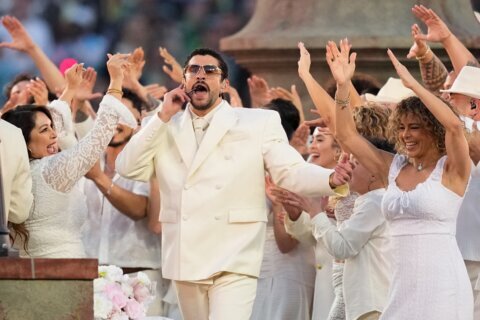Top 10 Biblical movies for Easter and Passover
Honorable Mentions:
- ‘Samson & Delilah’ (1949) – Cecil B. DeMille
- ‘Quo Vadis’ (1951) – Mervy LeRoy
- ‘The Robe’ (1953) – Henry Koster
- ‘Barabbas’ (1961) – Richard Fleischer
- ‘Jesus’ (1979) – John Krish & Peter Sykes
- ‘Noah’ (2014) – Darren Aronofsky
- ‘Son of God’ (2014) – Christopher Spencer
- ‘Mary Magdalene’ (2018) – Garth Davis
10. ‘The Passion of the Christ’ (2004) – Mel Gibson
A decade after his Best Picture win for “Braveheart” (1995), Mel Gibson directed Jim Caviezel as Jesus in his final 12 hours of brutal torture and crucifixion. The film earned three Oscar nominations for cinematography, makeup and original score, but its depiction of Jewish villains sparked claims of anti-semitism, bolstered by Gibson’s infamous drunk-driving rant in 2006. Still, the controversial film remains the top-grossing R-rated movie of all time ahead of “Deadpool,” “American Sniper” and “Joker.”
9. ‘Exodus: Gods and Kings’ (2014) – Ridley Scott
Unfairly slammed by critics, this throwback Biblical epic by Ridley Scott features a refreshing setup of slave rebellion, a chilling depiction of deadly plagues and a thrilling climax with a CGI-enhanced parting of the Red Sea. Mostly though, it’s a showcase for its dual leads, Christian Bale as Moses and Joel Edgerton as the Egyptian Pharaoh Ramses II, who essentially allow Scott to mourn the loss of his own brother, Tony Scott.
8. ‘The Bible: In the Beginning…’ (1966) – John Huston
Twenty five years after directing “The Maltese Falcon” (1941), John Huston explored the book of Genesis, including Adam & Eve, Cain & Abel, Noah’s Ark and Abraham & Isaac. Featuring haunting imagery set to Toshirô Mayuzumi’s Oscar-nominated score, the film memorably starred Richard Harris as Cain, George C. Scott as Abraham, Ava Gardner as Sarah, Peter O’Toole as the Three Angels and Huston himself as Noah, providing the namesake for his iconic character in “Chinatown” (1974).
7. ‘Jesus Christ Superstar’ (1973) – Norman Jewison
Based on the 1970 album and 1971 Broadway show by Andrew Lloyd Webber and Tim Rice, this electrifying rock opera follows a hippie band of actors who show up in the desert to perform a production of the final six days of Jesus’ life, as told through the eyes of Judas Iscariot. Featuring Oscar-nominated tunes like “What’s the Buzz?,” “Everything’s Alright,” “This Jesus Must Die” and “Superstar,” the film earned three Golden Globe nominations for Ted Neeley as Jesus, Carl Anderson as Judas and Yvonne Elliman as Mary Magdalene, all directed with avant-garde flair by Norman Jewison as his follow-up to “Fiddler on the Roof” (1971).
6. ‘King of Kings’ (1961) – Nicholas Ray
Six years after directing James Dean and Natalie Wood in “Rebel Without a Cause” (1955), painterly director Nicholas Ray cast “The Searchers” (1956) alum Jeffrey Hunter as Jesus Christ. Ray plays loose with the plot by building a parallel revolt by Barabbas and spending too much time on Herod Antipas’ relationship with Claudia and Salome to behead John the Baptist. Still, he artfully stages the Sermon on the Mount, Last Supper and Crucifixion, set to an Oscar-nominated score by the great Miklós Rózsa.
5. ‘The Greatest Story Ever Told’ (1965) – George Stevens
George Stevens remains the most underrated of the great Hollywood directors after “Swing Time” (1936), “A Place in the Sun” (1951), “Shane” (1953) and his masterpiece “Giant” (1956). His son, AFI founder George Stevens Jr., told WTOP that “The Greatest Story Ever Told” remains his father’s hidden gem, panned upon its release but fascinating in hindsight for Max von Sydow as Jesus, Claude Rains as King Herod, Charlton Heston as John the Baptist, Donald Pleasance as Satan, Dorothy McGuire as Mary, Sal Mineo as Uriah, Roddy McDowell as Matthew, Martin Landau as Caiaphas, Angela Lansbury as Claudia, Telly Savalas as Pontius Pilate, Sidney Poitier as Simon helping Jesus carry the cross and John Wayne as the Centurion quipping, “Truly, this was the Son of God.”
4. ‘The Last Temptation of Christ’ (1988) – Martin Scorsese
Right before he made his masterpiece “Goodfellas” (1990), Martin Scorsese’s “The Last Temptation of Christ” culminated the Italian Catholic themes of faith and doubt that he’d been exploring since “Mean Streets” (1973). The film opens with a disclaimer that it’s not based on the Gospels, but rather on Nikos Kazantzakis’ 1955 novel exploring Jesus’ duality of “human vs. superhuman.” Thus, Willem Dafoe’s unforgettable Jesus grapples with guilt over building crosses for the Romans, conflict over a revolution by his best friend Judas (Harvey Keitel) and ultimately his desire to have a family with Mary Magdalene (Barbara Hershey), presented in an extended dream sequence on the cross. The film was so controversial upon its release that protestors set fire to theaters in Europe. In hindsight, it remains one of the gutsiest movies Scorsese ever made.
3. ‘The Gospel According to St. Matthew’ (1964) – Pier Paolo Pasolini
After countless Hollywood epics of unrealistic blue-eyed saviors painted in Technicolor, Italian master Pier Paolo Pasolini presented a grittier, black-and-white truth as a fitting descendent of the Italian Neorealist Movement. In the process, he likely came the closest to the real-life Jesus of any film ever made, chronicling the Gospel of Matthew to present Jesus as a Marxist avant-la-lettre. Watching the film, you’ll contemplate how the revolutionary Jesus might rebuke today’s megachurch evangelicals the same way as the hypocritical Pharisees of Biblical times, overturning the money tables to show that love for the least among us, for the outcasts of society, will always trump the false prophets of greedy golden towers.
2. ‘The Ten Commandments’ (1956) – Cecil B. DeMille
Thirty three years after directing the silent masterpiece “The Ten Commandments” (1923), Cecil B. DeMille returned to the material for arguably the most iconic Biblical epic ever filmed. Nominated for seven Academy Awards, including Best Picture, the film won the Oscar for Best Visual Effects with the groundbreaking parting of the Red Sea. Charlton Heston earned a Golden Globe nomination for his performance as the screen’s definitive Moses, while Yul Brynner’s Pharaoh helped propel him to win the Oscar the same year for “The King & I” (1956). Surrounding them are Anne Baxter as Nefretiri, Vincent Price as Baka, John Carradine as Aaron and Edward G. Robinson memorably saying, “Where’s your Messiah now?” The nearly four-hour epic still regularly airs on television every Passover week, allowing new generations of grandparents, parents and children to bond over this classic of Hollywood’s Golden Age.
1. ‘Ben-Hur’ (1959) – William Wyler
Voted one of the American Film Institute’s Top 100 Movies, “Ben-Hur” remains the greatest Biblical epic of all time. Predating Stanley Kubrick’s “Spartacus” (1960) and Ridley Scott’s “Gladiator” (2000), William Wyler’s classic follows a Jewish prince named Judah Ben-Hur (Charlton Heston), who is betrayed and sentenced to slavery by his Roman friend Messala (Stephen Boyd), only to regain his freedom and seek revenge in a thrilling chariot race. Throughout this journey, Judah repeatedly encounters Jesus Christ, first feeding him water, then speaking in the countryside, and ultimately marching toward the cross. Adding to the allure, we never see Christ’s face, a magical cinematic experience enhanced by Miklós Rózsa’s spiritual score from Nativity to Crucifixion. The result won Wyler his third Best Director Oscar after “Mrs. Miniver” (1942) and “The Best Years of Our Lives” (1946), while the film earned 11 Oscars, including Best Picture, a stunning record that still stands today.
Jason Fraley
Hailed by The Washington Post for “his savantlike ability to name every Best Picture winner in history," Jason Fraley began at WTOP as Morning Drive Writer in 2008, film critic in 2011 and Entertainment Editor in 2014, providing daily arts coverage on-air and online.








